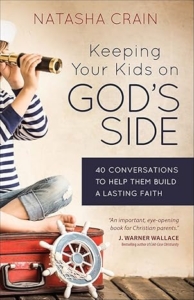Whenever I was in graduate school studying for my M.A. in Science and Religion, I was often the recipient of wide-eyed stares and exclamations of, “How on earth do you have enough hours in the day?!” After all, I was running a household, homeschooling two elementary-age boys, teaching intermittently at church, and nurturing my marriage all while working on a graduate degree. Post-graduation, I’m able to look back on those 3-and-a-half years with no regret and so very much to be thankful for. I would like to take this bit of space to encourage other busy wives and mothers (and husbands and dads!) by describing how and why I managed all of those responsibilities. Most of you are not considering graduate education, but what you should at least be planning is how to fit more learning time into your life, so that you can love and glorify God with your mind.
Make no mistake; I sacrificed some things. But those things pale in comparison to what I gained, both in value and longevity. I had to give up mindless entertainment, but it was replaced with the life-long discipline of worshiping God on an intellectual level. I socialized a lot less, but whenever I did meet up with friends, the time was intentional and well-spent in deep conversation that grew those relationships unlike anything else could. I learned the value of rising early and making the most of every hour, yet I never denied myself a full night’s rest or a minimum of a half day’s rest each week.
Did my family sacrifice? In some ways, they did. My children did not get to attend every play group, birthday party, or kids’ church function that came around, but we did go to those things occasionally. We still did fun things like movies and park outings, but I had to economize my time in advance. My husband (who, incidentally, is my biggest supporter and most ardent fan) would often run an errand for me after work and we’d eat takeout a couple (or three) times per week. But you know what? He never once complained. He understood perfectly why I was doing what I was doing, that I was fulfilling God’s call on my life and investing my time in an important way. I asked him recently if he mourned the fact that I spend more time in books than I do in the kitchen. He laughed, then assured me that I was exactly the type of woman he wanted to be married to and to have as the mother of his sons. He sees the eternal value in what I am modeling for our children and what I’ve equipped myself to teach them before they face the world on their own. It is true that I almost never bake cakes from scratch, and my house isn’t always immaculate, but I can teach my kids how to be confident in their faith, and to defend their beliefs and worldview in the face of inevitable challenges.
Now that I’m finished with my degree, I have found that the extra time that became available to me has been naturally filled with self-study, writing, and teaching. I do participate in more leisure and social activities, but I’m still very intentional about how I spend my time. One of my sons saw me reading one afternoon shortly after graduation and he said, “Mom, what are you doing? I thought you were done with school.” To which I responded, “Sweetie, school ends, but learning should be life-long.” As parents, our actions speak so much louder than words.
Honoring God and fulfilling the command to reach the world for Christ is a mission that requires knowledge, including a good foundation in apologetics. We must always be prepared to give the reasons for the hope that we have! Sometimes, it will be the educated skeptic that demands answers. To be sure, coming up short in such a situation does not glorify the Lord. It isn’t possible for everyone to be an expert, and surely God has a different plan for each of us. But it is possible for every Christian to develop the discipline of study and to work towards having the conversational and research skills necessary to be an effective ambassador both to the world and to their own children.
Are you at a complete loss for where to begin? How about the most central doctrine of Christianity–the Resurrection of Jesus? There are fantastic resources available to you. For beginners, I would suggest Cold Case Christianity by J. Warner Wallace. I would follow this with a basic and broad apologetics overview, such as Douglas Groothius’ book, Christian Apologetics: A Comprehensive Case for Biblical Faith (don’t be put off by the page count; it’s actually a relatively quick read arranged by topic). Don’t have a lot of time to sit and read? No problem! There are many excellent podcasts available through iTunes that you could listen to in the car or during exercise. I personally like to watch apologetics and theology videos on my iPad whenever I’m folding a mountain of laundry or unloading/reloading the dishwasher. I recommend the podcasts and videos available through http://www.str.org, http://www.reasonablefaith.org, http://www.johnlennox.org, http://www.idthefuture.com, and http://www.rzim.org. Additionally, Biola University has a large selection of lectures available for free through iTunesU. This is only a fraction of the resources out there.
Just imagine the difference it would make if you were to give up a mere three or four hours of entertainment per week and replace them with high quality apologetics and theology material. I challenge you to try it for one month. I can guarantee that you will never be the same! Worshiping God with your mind is rewarding in a way that intensifies one’s motivation for it. I think of it as the ultimate perpetual motion machine!



















 COLD-CASE CHRISTIANITY FOR KIDS
COLD-CASE CHRISTIANITY FOR KIDS FEARLESS FAITH SEMINAR
FEARLESS FAITH SEMINAR